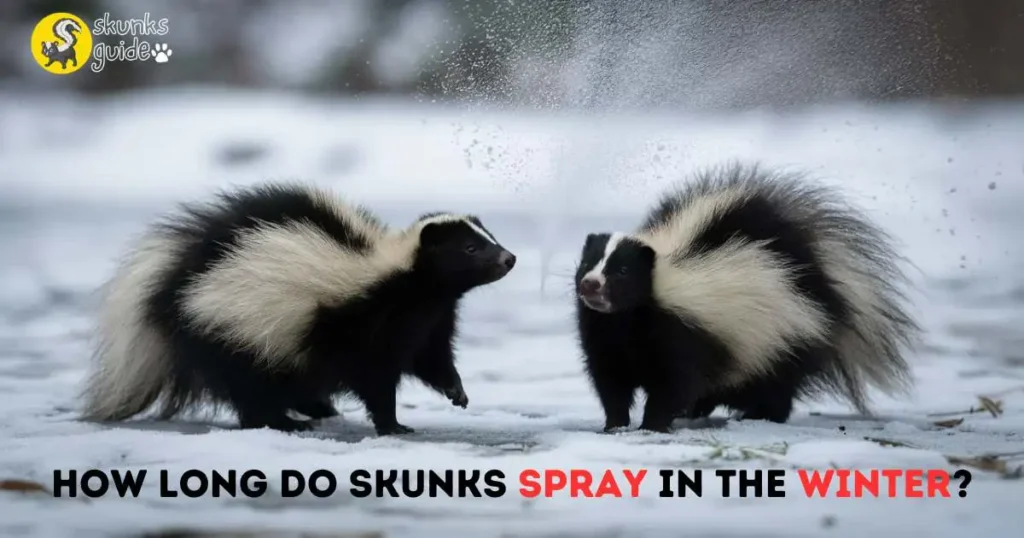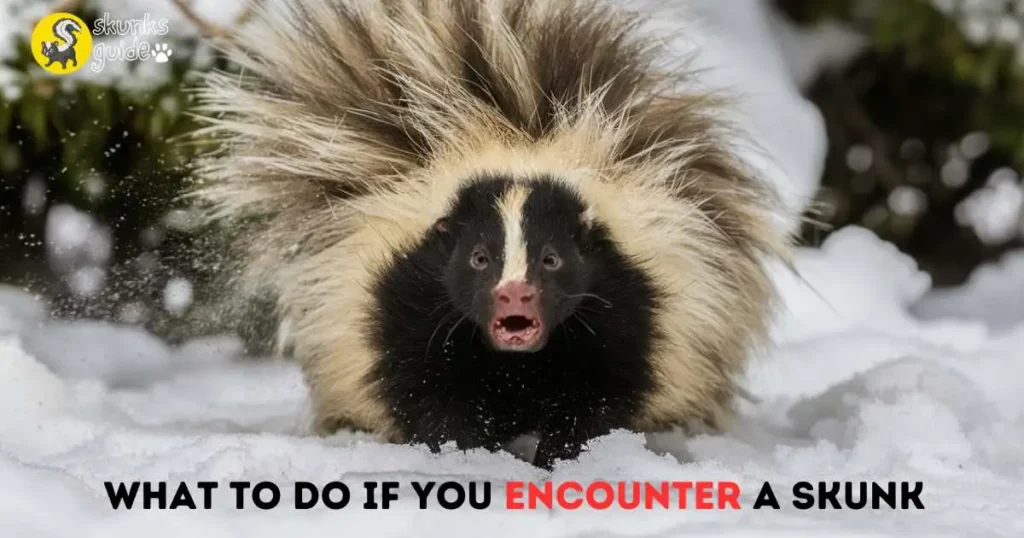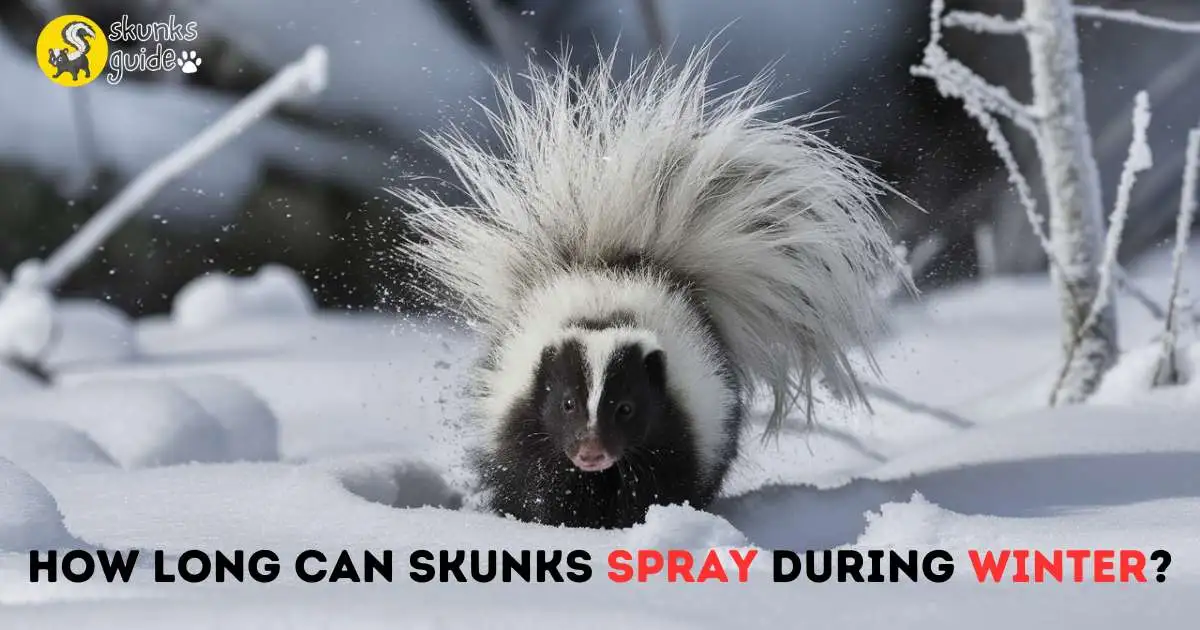Do Skunks Spray in Winter? Here’s the Answer
Last updated on February 25th, 2025 at 11:04 pm
Winter skunk behavior is quite interesting and often overlooked. Skunks change their ways to make it through the cold, including their famous spray. Knowing how long skunks spray helps us understand their defense and how they deal with threats. This article looks into skunks in winter, covering their biology, social life, and behavior. Get ready to learn about the importance of skunk spray in their survival.
Understanding Skunk Physiology
Skunk physiology is key to their survival. They have special glands near their tail base. These glands make a strong chemical called skunk spray. This spray keeps predators away.
Skunks use their spray when they feel threatened. They can shoot the spray up to 10 feet away. This helps them protect themselves without fighting.
Skunks’ body features are both interesting and vital for living in different places. Knowing about their anatomy and how they spray helps us understand them better. It shows how they fit into their environment.
How Long Do Skunks Spray in the Winter?
Skunks are more active in the winter, especially in their dens. Knowing how long they spray can help keep them safe and protect the environment.

The Mechanics of Skunk Spray
Skunks have a special gland under their tails that makes a foul-smelling liquid. When they feel threatened, they can spray this liquid with great accuracy. This spray helps them defend against predators in the cold months.
Duration of Spray and Its Impact
The spray can last from a few seconds to many bursts, based on the threat level. The smell from the spray can last for days, affecting skunks, humans, and pets nearby. It’s important for people living near skunks to know this to take the right precautions.
| Parameter | Description |
|---|---|
| Skunk Spray Duration | Varies from a few seconds to multiple bursts. |
| Mechanics of Spray | Utilizes specialized glands and muscle contractions. |
| Effect Duration | Odor can persist for several days in the environment. |
| Seasonal Variability | Effects are more pronounced in winter due to skunk activity. |
Dietary Habits of Skunks in Winter
Skunks have special ways to survive the cold winter. They eat a variety of foods, including insects and fruits. They also eat things they find in the garbage or hunt for. This makes them good at finding food even when it’s hard to find.
What Do Skunks Eat During Cold Months?
In winter, skunks eat many things. Their diet includes:
- Insects, such as beetles and caterpillars
- Fruits like berries and apples
- Scavenged food from garbage or hunting
- Small mammals and eggs if they can
This mix of foods helps them stay warm and strong during the cold. Their ability to find different foods is key to surviving the winter.
Foraging Behavior in Winter
Skunks are more active at night during mild winter days. They go out to look for food, which can sometimes disturb gardens and yards. Their night time searching helps them find food that’s hard to find. Watching how they forage gives us clues about how they live in cities.
| Food Source | Nutrition Type | Availability in Winter |
|---|---|---|
| Insects | Protein | Low |
| Fruits | Vitamins | Moderate |
| Scavenged food | Energy | High |
| Small mammals | Protein | Variable |
What to Do If You Encounter a Skunk
Meeting a skunk can be a surprise. It’s key to stay calm when you see one. Moving quickly might scare the skunk, causing it to spray. So, watch how they act instead.

If a skunk lifts its tail or hisses, it’s warning you to stay away. These signs mean it’s trying to protect itself.
Here’s how to handle a skunk safely:
- Remain calm and quiet.
- Slowly move back without turning your back on the skunk.
- Let the skunk leave if it wants to.
- Avoid eye contact, as it might be seen as a threat.
Knowing how to act around skunks helps us live peacefully with wildlife. If a skunk doesn’t spray when it feels threatened, you can watch it safely. Paying attention to their signs makes encounters better.
Skunk Odor Management
Dealing with skunk smells needs a careful plan, since skunk spray is very strong. Using good skunk odor management can really help. Old ways to clean often don’t work well, so we need to look for better options.
Effective Methods to Neutralize Skunk Spray Odor
When you get sprayed by a skunk, act fast with the right skunk odor remedies. While tomato juice is often suggested, a mix of hydrogen peroxide, baking soda, and dish soap works better. This mix not only gets rid of the smell but also breaks down the smell-causing compounds.
Here are some effective strategies:
- Hydrogen Peroxide Solution: Mix one quart of hydrogen peroxide (3%), 1/4 cup of baking soda, and a teaspoon of dish soap. Apply this mixture right away and all over the affected area.
- Vinegar Spray: Use equal parts of vinegar and water in a spray bottle. This mix can help cover and neutralize smells on clothes or surfaces.
- Commercial Skunk Odor Neutralizers: There are many products made just for getting rid of skunk smell, using special chemistry to fight strong odors.
Proper cleaning right after an encounter is crucial for these methods to work best. The sooner you use these skunk odor remedies, the better they will work. A quick and detailed clean can greatly reduce any remaining smells.
Conclusion
Understanding skunk behavior is key, especially in winter when they act differently due to the cold and less food. Skunks use their unique spray as a defense. Knowing how long they spray helps in handling winter skunk encounters.
This article covered their body, social life, and what they eat. It shows how they adjust to the cold. Identifying skunk signs like trails and droppings helps avoid them. Using good strategies for winter skunk encounters is important for living peacefully with them.
Learning about skunk behavior helps us value their role in nature and reduce risks from skunk spray. By being aware and respectful of wildlife, we can have a better relationship with these special animals.
FAQ
What behaviors do skunks exhibit during the winter months?
In winter, skunks are less active and often sleep a lot in their dens. They come out on milder nights to find food. This helps them save energy while staying up at night.
How effective is skunk spray in deterring predators?
Skunk spray is very effective. Skunks have glands that make a strong chemical. This spray can reach up to 10 feet and keeps most predators away, making it a key defense.
What factors influence skunk socialization in winter?
Skunks usually live alone, but sometimes they join small groups in winter for warmth. This helps them stay warm and save energy in the cold.

